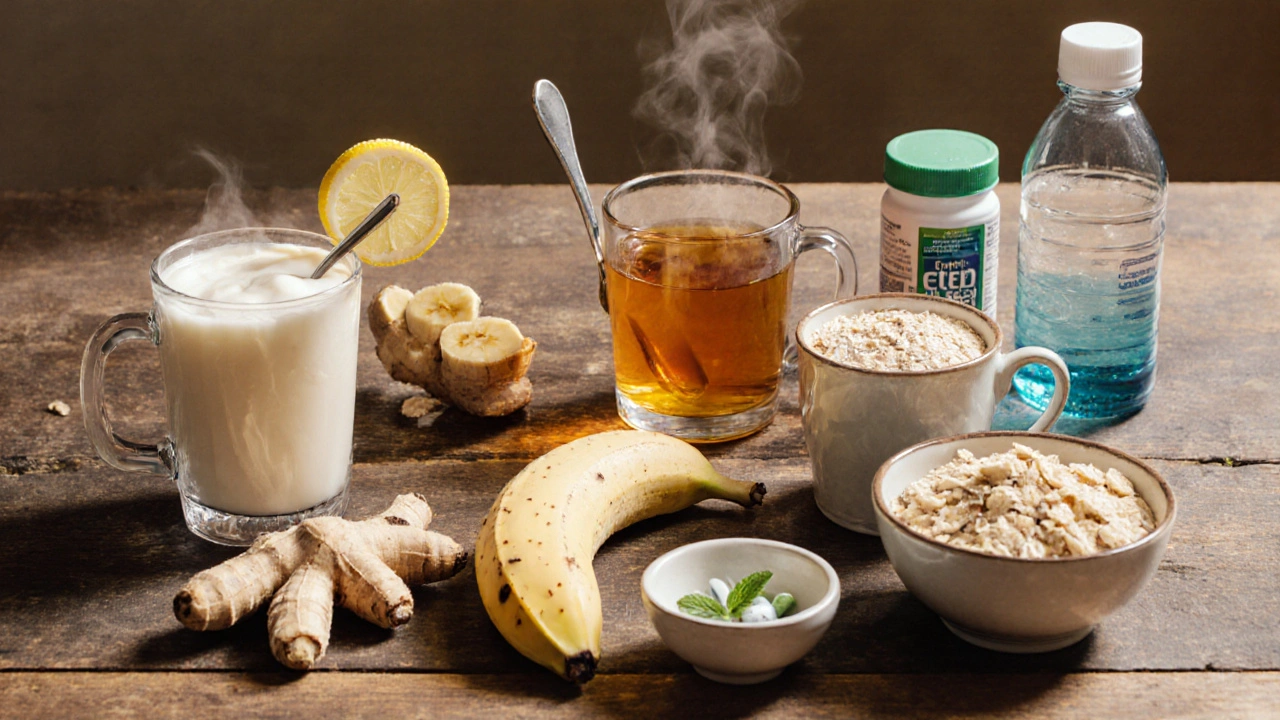Natural Remedy Selector for Chronic Diarrhea
Recommended Remedy:
Living with chronic diarrhea can feel like a constant race to the bathroom, leaving you exhausted, dehydrated, and worried about nutrition. While a doctor’s advice is essential for ruling out serious conditions, many people turn to gentle, naturally‑derived options to calm the gut and restore balance. Below you’ll find the ten most effective natural remedies, why they work, how to use them safely, and quick ways to decide which one fits your lifestyle.
What Exactly Is Chronic Diarrhea?
Chronic diarrhea is defined as loose, watery stools lasting longer than four weeks. It can stem from infections, inflammatory bowel disease, IBS, medication side‑effects, or an imbalance of gut bacteria. The key concerns are fluid loss, electrolyte imbalance, and nutrient malabsorption. Signs that merit a medical check‑up include blood in stool, unexplained weight loss, fever, or severe dehydration.
When to Seek Professional Help
- Stools contain blood or mucus.
- Unintentional weight loss exceeds 5% of body weight.
- Fever over 38°C (100.4°F) persists.
- Dehydration symptoms such as dizziness, dry mouth, or rapid heartbeat.
- Diarrhea continues despite dietary changes for more than two weeks.
If any of these appear, book an appointment promptly. Natural remedies work best alongside, not instead of, professional care.
1. Probiotic Yogurt a fermented dairy product packed with live beneficial bacteria
Probiotics help repopulate the gut with friendly microbes, which can reduce the frequency of watery stools. Look for yogurts containing Lactobacillusacidophilus or Bifidobacteriumlongum. A typical dose is one cup (≈240ml) taken once daily, preferably with a meal to protect the bacteria from stomach acid.
Caution: Choose low‑sugar varieties; excess sugar can worsen diarrhea.
2. Apple Cider Vinegar a fermented apple juice rich in acetic acid
Apple cider vinegar (ACV) promotes stomach acidity, which aids digestion and slows down transit time. Mix one tablespoon of raw, unfiltered ACV into a glass of water and sip before meals. Some people add a teaspoon of honey for taste.
Caution: Dilute ACV; undiluted vinegar can irritate the esophagus.
3. Chamomile Tea a soothing herbal infusion made from dried chamomile flowers
Chamomile possesses anti‑inflammatory and antispasmodic properties that calm intestinal cramps. Brew one to two teaspoons of dried chamomile in hot water for 5‑10minutes, then drink 2‑3 cups a day. It also doubles as a mild sleep aid, which can be helpful when night‑time trips to the bathroom disrupt rest.
Caution: Avoid if you have a known allergy to ragweed or related plants.

4. Ginger a rhizome known for its digestive‑supporting compounds gingerol and shogaol
Ginger speeds up gastric emptying and reduces nausea, which can indirectly lessen diarrhea. Fresh ginger can be grated into hot water (≈1inche piece per cup) for a tea, or added to meals. Aim for 1‑2grams of ginger daily, split across meals.
Caution: High doses (over 5grams) may cause heartburn.
5. Banana a starchy fruit rich in potassium and pectin
Bananas supply potassium, an electrolyte lost in diarrhea, and pectin, a soluble fiber that absorbs excess water in the gut. Eat one ripe banana 2‑3 times a day, or blend it into a smoothie with a splash of almond milk.
Caution: Very ripe bananas are sweeter and may increase stool osmolality for some people; start with half a banana if you’re unsure.
6. Oatmeal a whole‑grain breakfast food high in soluble fiber
Oatmeal’s soluble fiber forms a gel that slows digestion and adds bulk to stools. Prepare ½cup of rolled oats with water or low‑fat milk, and top with a few banana slices for extra potassium. Eat once daily during the flare‑up phase.
Caution: Avoid instant oatmeal packets with added sugars or artificial flavors.
7. Bone Broth a nutrient‑dense liquid made by simmering animal bones
Bone broth rehydrates the body while delivering collagen, electrolytes, and amino acids that support gut lining repair. Sip 1‑2 cups throughout the day, especially after a bathroom run.
Caution: Choose low‑sodium versions to avoid excess salt intake.
8. Psyllium Husk a soluble fiber derived from the seeds of Plantago ovata
Psyllium absorbs water, turning watery stools into more formed ones. Mix one teaspoon of psyllium husk with a full glass of water, stir, and drink immediately. Follow with another glass of water to prevent choking.
Caution: Start with half a teaspoon; too much can cause bloating.

9. Peppermint Oil an essential oil extracted from peppermint leaves
Peppermint oil relaxes the smooth muscle of the intestines, easing cramping and rapid transit. Use enteric‑coated capsules (0.2ml per capsule) 2‑3 times a day. The coating ensures the oil reaches the intestines before releasing.
Caution: Not recommended for people with gastroesophageal reflux disease (GERD) or gallstones.
10. Electrolyte Solution a balanced drink containing sodium, potassium, and glucose
Rehydration is the cornerstone of diarrhea management. Commercial oral rehydration salts (ORS) or homemade solutions (½tsp salt + ½tsp baking soda + 6tsp sugar dissolved in 1L water) restore fluid balance. Aim for 1L per hour during acute episodes, tapering as stools improve.
Caution: Overuse can lead to hypernatremia; stick to recommended concentrations.
Quick Reference Table
| Remedy | How It Works | Typical Dose | Key Caution |
|---|---|---|---|
| Probiotic Yogurt | Repopulates gut bacteria | 1 cup daily | Low‑sugar choice |
| Apple Cider Vinegar | Increases stomach acidity | 1 tbsp diluted in water | Dilute to avoid irritation |
| Chamomile Tea | Anti‑inflammatory, antispasmodic | 2‑3 cups/day | Avoid if ragweed‑allergic |
| Ginger | Speeds gastric emptying | 1‑2g fresh daily | High doses → heartburn |
| Banana | Provides potassium & pectin | 1 ripe banana 2‑3×/day | Watch for sweetness‑related osmotic effect |
| Oatmeal | Soluble fiber adds bulk | ½ cup cooked | Avoid sugary instant packs |
| Bone Broth | Rehydrates & supports gut lining | 1‑2 cups/day | Low‑sodium preferred |
| Psyllium Husk | Absorbs water, firms stool | ½‑1 tsp with water | Drink plenty of fluid |
| Peppermint Oil | Relax intestinal smooth muscle | 0.2ml capsule 2‑3×/day | Not for GERD or gallstones |
| Electrolyte Solution | Restores fluid & electrolytes | 1L/hour during acute phase | Follow exact concentration |
Checklist: How to Pick the Right Remedy
- Identify your main symptom-cramping, excess fluid loss, or nutrient deficiency.
- Match the symptom to a remedy’s primary action (e.g., cramping → peppermint oil or chamomile).
- Consider dietary restrictions (dairy‑free? avoid yogurt; vegan? choose plant‑based probiotics).
- Start with the lowest effective dose to gauge tolerance.
- Track stool frequency, consistency, and any side‑effects for 3‑5 days.
- If no improvement, rotate to another remedy or combine two complementary options (e.g., probiotic + electrolyte solution).
Frequently Asked Questions
Frequently Asked Questions
Can I rely solely on natural remedies for chronic diarrhea?
Natural remedies are great for managing symptoms and supporting gut health, but they don’t replace a medical evaluation. If the diarrhea persists beyond a few weeks or comes with alarming signs, see a healthcare professional.
How long does it usually take to see results?
Most people notice calmer stools within 2‑5 days of consistent use. Probiotics may need a week or longer to reshape the gut flora.
Are there any interactions with prescribed medications?
Peppermint oil can increase the absorption of certain antibiotics, and high‑dose ginger may affect blood‑thinners. Always check with your doctor before adding new herbs if you’re on prescription meds.
Is it safe to use these remedies while pregnant?
Most options-like banana, oatmeal, and bone broth-are pregnancy‑friendly. However, peppermint oil capsules and high‑dose ginger should be discussed with an obstetrician first.
Can I combine more than one remedy?
Yes, pairing a probiotic (for gut flora) with an electrolyte solution (for rehydration) works well. Just watch for overlapping ingredients-don’t double‑dose potassium from both bananas and electrolyte drinks.
If you follow the steps above, you’ll have a toolbox of natural remedies for chronic diarrhea that can ease symptoms, restore balance, and keep you active while you wait for a definitive medical answer.

Jessica Simpson
October 6, 2025 AT 14:27I found the table super handy, especially the quick reference for dosage. The probiotics tip reminded me of a kefir starter I use in my smoothie bowls. If you’re dairy‑free, look for a coconut‑based probiotic powder-works just as well. Also, sipping a bit of diluted ACV before meals can calm that rapid transit you described. Keep an eye on sugar content in yogurts, it can sneakily worsen the sweeet symptoms.
Ryan Smith
October 10, 2025 AT 20:00Sure, because drinking apple cider vinegar is exactly what the secret pharma cartel wants you to do.
John Carruth
October 15, 2025 AT 01:32First and foremost, it's crucial to recognize that chronic diarrhea is not merely an inconvenience but a signal that your gastrointestinal ecosystem is out of balance. When you introduce a probiotic yogurt, think of it as seeding the soil before planting a garden; the beneficial bacteria need a hospitable environment to flourish. That's why pairing it with a low‑sugar, high‑fiber snack such as oatmeal creates the perfect substrate for those microbes to colonize. Simultaneously, maintaining adequate hydration through an electrolyte solution prevents the cascade of electrolyte depletion that can exacerbate muscle cramps and heart palpitations. Incorporating ginger or peppermint oil early in the day can temper the hyper‑motility that often characterizes diarrheal episodes. Both of these botanicals act as gentle antispasmodics, smoothing the rhythmic contractions of the intestines without resorting to prescription antidiarrheals. However, you must be mindful of dosage; a half teaspoon of psyllium husk followed by a full glass of water is sufficient for most adults, and increasing the amount too quickly may lead to bloating. Bananas, as highlighted in the guide, are an excellent source of potassium, yet they also provide pectin, which acts as a natural stool‑bulking agent. If you find that the bananas are too sweet for your gut, consider partially ripe ones or blend them with plain Greek yogurt to moderate the osmotic effect. Bone broth delivers not only electrolytes but also collagen, which some studies suggest can aid in repairing the mucosal lining of the gut. For those adhering to a vegan regimen, a vegetable‑based broth enriched with sea salt and a splash of apple cider vinegar can serve as a comparable alternative. When tracking your progress, keep a simple log of stool frequency, consistency, and any accompanying symptoms such as cramping or nausea. After three to five days of consistent intake, you should notice a trend toward firmer stools and reduced urgency. If no improvement is observed, it may be time to rotate to a different probiotic strain or consult a healthcare professional for further evaluation. Ultimately, the combination of these natural remedies, when applied thoughtfully and monitored diligently, can restore equilibrium and empower you to manage chronic diarrhea without compromising your quality of life.
Melodi Young
October 19, 2025 AT 07:04Great rundown! Just a heads‑up: many store‑bought yogurts sneak in added fruit syrups that spike the sugar load, so opt for plain or Greek varieties. Also, remember that peppermint oil capsules should be enteric‑coated; otherwise the oil can irritate the stomach lining. If you’re combining psyllium with a lot of liquid, you’ll avoid the dreaded clumping issue. Overall, these tweaks keep the plan both effective and comfortable.
Tanna Dunlap
October 23, 2025 AT 12:37While the natural options are tempting, relying on them without proper medical oversight borders on negligence; chronic diarrhea can be symptomatic of serious underlying conditions, and delaying professional diagnosis is irresponsible.
Troy Freund
October 27, 2025 AT 17:09It's true that self‑diagnosing can be risky, but there’s also value in empowering people with low‑risk strategies they can try while awaiting a doctor's appointment. The key is to treat these remedies as adjuncts, not replacements, and to monitor any red‑flag symptoms closely.
Mauricio Banvard
October 31, 2025 AT 22:41Exactly, the “big pharma” narrative loves to keep us blind to cheap, home‑grown fixes like ginger tea that can dodge their profit pipelines. Just make sure you don’t over‑dose on the spice, or you might end up with a fiery heartburn surprise.
Paul Hughes
November 5, 2025 AT 04:14😊 Appreciate the thoroughness-having a cheat‑sheet makes it less overwhelming when you’re stuck in the bathroom line.
Mary Latham
November 9, 2025 AT 09:46Yo, I totally get it but jus t tell ya, some of these remedies r just plop on the internet an dont work 4 evryone. Like, if you ain't allergic to dairy grab that yogurt but dont overdo the sugar, ya know?
Marie Green
November 13, 2025 AT 15:18Take it slow and listen to your body.
TOM PAUL
November 17, 2025 AT 20:50Exactly, pacing yourself is the secret sauce-start with a small dose of probiotic yogurt and see how your gut reacts before adding more layers like electrolyte drinks.
Ash Charles
November 22, 2025 AT 02:23STOP scrolling endless forums and actually implement a plan; pick one remedy, stick to the dosing schedule, and track results for a full week before jumping to the next. No excuses.
Michael GOUFIER
November 26, 2025 AT 07:55Permit me to emphasize the importance of adhering to evidence‑based protocols when employing adjunctive natural therapies; while the remedies enumerated possess pharmacodynamic merit, they must be integrated within a framework of clinical oversight to mitigate the risk of iatrogenic complications.
michael Mc Laughlin
November 30, 2025 AT 13:27Sounds good. Lets keep it simple and give it a try :)